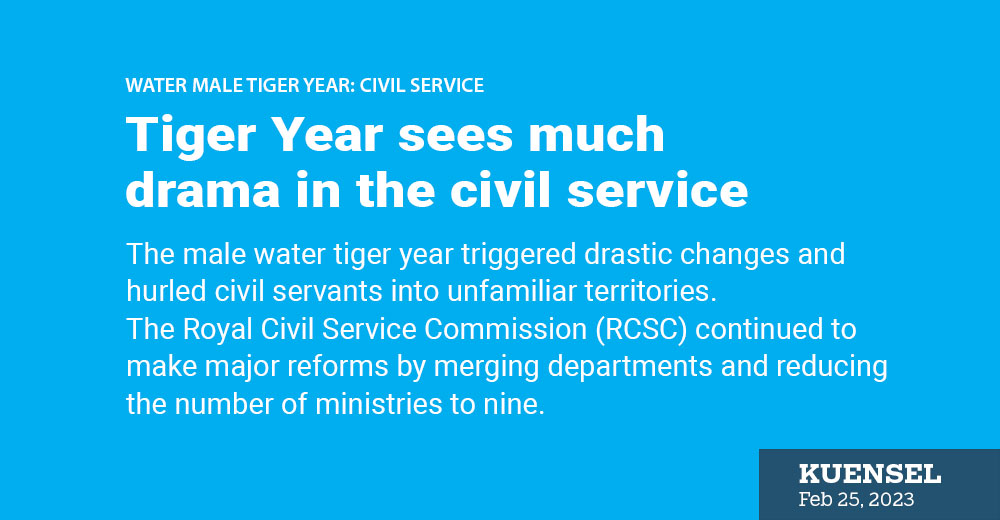Dechen Dolkar
Water Male Tiger Year: Civil Service – The male water tiger year triggered drastic changes and hurled civil servants into unfamiliar territories.
The Royal Civil Service Commission (RCSC) continued to make major reforms by merging departments and reducing the number of ministries to nine.
The reforms targeted to make the civil service agencies more coordinated and better positioned to tackle challenges, make the system more relevant, efficient, and effective, and build capacity to improve productivity.
With the reforms, civil servants exited the system in growing numbers. About 1,488 civil servants resigned voluntarily in just last year.
The mass resignation of civil servants, especially mid-level professionals, and critical employees, is happening when the civil service is going through a period of major change.
Talks of a clean wage system excited the civil servants and many believed they would get a pay package without hidden benefits. When the Pay Structure Reform Bill was tabled in the winter parliament session, the excitement grew. Civil servants expected that their salaries would increase several fold. However, the Bill was about re-structuring the existing pay and allowances and not much about increasing the salary.
The Pay Structure Reform Act consisted of a pay structure of fixed pay and variable pay. The Act changed leave travel concession (LTC) and leave encashment (LE) of one month’s minimum pay scale to be prorated per month or the lump sum amount divided into 12 months.
The Parliament also enacted the Civil Service Reform Act 2022, which was supposed to revamp civil service. The Act was implemented on December 30 last year and requires a minister to step down.
In the year of the Tiger, one of the chiefs was demoted with a grade for criticising the government’s policies and actions on social media.
Of the 230 P1 Management (P1M) level officials that RCSC assessed only 34 chiefs came out as most outstanding and eligible for executive positions in the civil service.
P1M forms the critical talent pool for leadership positions and this assessment is expected to provide the executive selection process with more accurate data points for merit-based selections.
However, given the current resignation trend, the pool is shrinking. As per the RCSC record, a total of 40 officials in P1 have separated from the civil service this year between January and February 9.
RCSC also made stricter leave rules for civil servants. While availing extraordinary leave, they cannot prefix and suffix different types of leave to EOL.
RCSC has overruled its initial decision to revoke the promotion of 53 civil servants in Pemagatshel, which was due in July because document submission in the Zhiyog Electronic System (ZESt) was not completed before the deadline.
Civil servants were earlier denied promotion after the dzongkhag human resource officer missed the document submission deadline on the RCSC online system.
RCSC also initiated to pay Nu 10,000 to every civil servant on the birth of a child under the Civil Servant’s Welfare Scheme (CSWS).
However, the Water Female Rabbit year seems more promising for civil servants after the government constituted the sixth pay commission.


